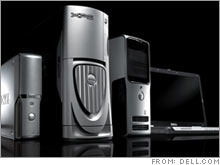|
Dell: Deal or no deal
Despite its intriguing Alienware play, analysts say the PC maker won't go on a shopping spree anytime soon. Still, the deal is a clear departure.
NEW YORK (CNNMoney.com) - When Dell announced plans last month to buy Alienware, a maker of high-end PCs for serious gamers, the deal made big news despite its small size. With Alienware's roughly $172 million in revenue, analysts say the impact of the deal will probably be of little consequence to Dell (up $0.12 to $29.85, Research). What made the news shocking is that the words "Dell" and "acquisition" are seldom mentioned in the same breath.
So why would Dell buy now? One word: growth. The overall market for PCs is expected to grow just 10.5 percent this year, according to research firm IDC. Florida-based Alienware, which makes high-end gaming PCs that cost up to $10,000, grew 30 percent in 2005, estimates analyst Daniel Renouard of Robert W. Baird & Co. In an era of slowing PC growth across the industry, the growth potential for gaming PCs such as those made by Alienware undoubtedly appeals to the No. 1 computer maker. Growth is especially important to Dell now, because its stock has slipped 22 percent in the last 12 months on concerns about Dell's ability to churn out double-digit percentage growth on $56 billion in revenue. Indeed, analysts are forecasting revenue growth of 9 percent for the current fiscal year. Since organic growth will be tougher to come by than it has been in the past, acquiring companies could be a sensible way to kick start growth. New deals for Dell?
For its part, Dell maintains the Alienware deal was simply the right strategic fit at the right time. Company spokesman Jess Blackburn said the deal in no way represents a big move in how Dell views deals. "We've never said we wouldn't consider acquisitions; we've said we rely more on organic growth," said Blackburn. "We're obviously a company that doesn't have a history of doing many acquisitions; if we have this conversation in 10 years, that'll probably still be characteristic of us," he said. But not all analysts are buying that. They point out that Dell has to do something to fuel growth, and they think the Alienware deal means Dell is testing the waters. Renouard of Robert W. Baird & Co. thinks the deal gives Dell access to one of the fastest growing niches in the PC industry and signals that Dell is likely more serious about doing deals to fuel its growth prospects. "We believe this represents a fundamental shift for the company and, at a minimum, indicates management is serious about considering all options for profitable growth," Renouard wrote in a note to clients. Also, by starting with a relatively small deal and allowing Alienware -- a name that carries heft in the high-end gaming market -- to run independently, Dell is in a position to learn from the experience and better prepare for a larger deal, if a sensible one comes along, the analyst wrote. Roger Kay, president of technology research and consulting firm Endpoint Technologies, points out that Dell could face pressure from Wall Street to do more deals, in part because Dell's stock has under performed as the company readjusts Wall Street's expectations for slowing growth. "If a company is sort of a cash cow but doesn't reinvest in anything but marketable securities, then Wall Street gets impatient," said Kay, pointing out that Dell has a huge cash hoard -- about $7 billion in cash on its balance sheet as of February. Goosing growth, one way or another
Chirag Vasavada, an analyst at T. Rowe Price whose firm owns a sizable position in Dell in the funds he advises on, said he thinks the company should stick to figuring out how to grow organically. He thinks that buying back shares is a better use of the company's cash, in part because there simply aren't that many attractive deals to be done. "There aren't a lot of compelling deals, and they've done a good job, historically, of organic growth," he said. "I don't think it represents a material change in their strategy." But it does indicate a heightened commitment to the consumer PC business, said Vasavada. Dell, which makes the bulk of its sales selling computers to corporate customers, first indicated a renewed focus on the consumer when it launched its XPS line of higher-end PCs, some of which are targeted at gamers. Individual consumers accounted for 14 percent of Dell's sales in the U.S. last year. Vasavada said technology companies typically acquire other companies to gain either intellectual property, incremental market share or a distribution channel. He classifies the Alienware deal as a "market share" deal and thinks that while similar "niche market" deals might make sense for the company, a low-cost, high-volume player like Dell should be able to grow its market share organically. Endpoint's Kay does not own shares of Dell. Renouard does not own shares of Dell, but Robert W. Baird & Co. does banking business with the company. -------------- Michael Dell on Alienware, growth and AMD: Click here.
Where's Dell on the Fortune 500? Click here. |
|

